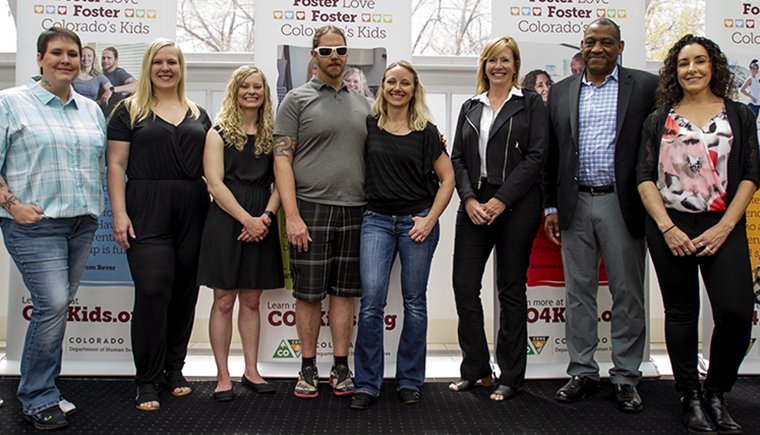DENVER (May 11, 2019) — On Saturday, Gov. Jared Polis and Minna Castillo Cohen, director of the Colorado Department of Human Services (CDHS) Office of Children, Youth and Families (OCYF), recognized five foster families from across Colorado for their dedication to Colorado’s children and teens in foster care. In addition to playing a critical role by providing safe, stable homes for Colorado’s children, each family is sharing their story to inspire others to help address the statewide need for foster families. Friends and family, as well as community leaders and county representatives, attended a private luncheon at the Governor’s Mansion to recognize each family’s contributions.
The honorees were Tom and Teresa Bever of Fort Collins; Wendy Bryner of Fort Collins; Mike and Ramona Evans of Denver; Melody Frey of Grand Junction; and Morgan Norling and Whitney Wehrkamp of Colorado Springs. You can watch videos of the families discussing their foster care experience here.
“Each of the families we celebrated today have one thing in common,” said Polis. “They saw the need to support children and families in their communities and they stepped forward to meet that need. I am so appreciative of their dedication to Colorado’s kids. When individuals and families work together, we can build a Colorado that sets all kids up for success.” Learn more about each family.
Foster parents provide a safe, temporary home for children whose parents need time to address safety concerns. County human services agencies, child placement agencies and community partners across the state are collaborating to recruit additional foster parents so children can remain in their communities while they are temporarily living with a foster family. There is a particular need for foster parents who are willing to care for children with complex behavioral and mental health needs, sibling groups and children whose first language is not English.
In most situations, children are able to continue living at home with their parents or caregivers while local human service agencies provide support and resources. Of the 20,817 children and teens served by county human services agencies throughout Colorado last year, 68 percent were able to continue living at home while their parents learned new skills and addressed safety concerns.
However, sometimes it is not possible for county human services agencies to ensure the safety of a child in their own home while connecting parents and caregivers with support and services. Each day in Colorado, approximately 12 children and teens enter foster care. There are currently 4,621 children and teens in an out-of-home placement such as a foster family, group home or residential treatment center.
“When children and families need additional support, county human service agencies work to meet those needs while keeping families together,” said Castillo Cohen. “If that is not possible, we first look for kin – those adults who have an established, trusted relationship with the child – and then a foster family to provide safety. Kinship and foster families do so much more than keep kids safe – they champion reunification and connections with a child’s family, they support a young person’s own treatment needs, and they create an accepting environment where young people can grow and flourish.”
In Colorado, 1,451 children or teens are growing up with a kinship family, and approximately 2,159 children and teens are growing up with a foster family.
An additional 666 children or teens are growing up in a congregate setting, such as a residential treatment center or group home. Many of these young people are ready to be with kin or a foster family, where they are better able to heal from their past traumatic experiences, but no family is available to care for them.
Colorado welcomes and encourages every adult to consider becoming a foster parent. Foster parents can be:
- Single, married or in a committed relationship
- All races and ethnicities
- All sexual orientations, gender identities or gender expressions
- Homeowners or renters
- An experienced parent or a first-time parent
- Older or young (minimum 21 years old)
We all play a role in strengthening families. To learn how you can become a foster parent in Colorado, visit http://CO4Kids.org.
